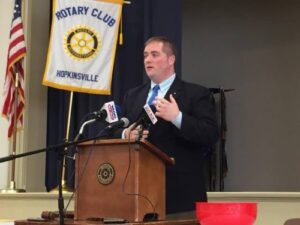Hopkinsville Mayor Carter Hendricks and others in the city’s administration will meet with state legislators next week to plead for some type of relief from crippling increases to pension liability in the coming years, but it’s unclear if any relief will come this session.
Chief Financial Officer Robert Martin presented projected numbers to the Committee of the Whole last week showing the annual pension cost for the city increasing by about $2.2 million over the next four years and by about $2.7 million over the next decade.
If city council does nothing and if the city only experiences minimal revenue growth outside of any tax increases, there would be significant budget shortfalls over the next five years—beginning with just over $1 million next fiscal year and about $4.8 million in 2024-2025.
The General Assembly could separate the County Employee Retirement System from other plans that are in worse condition, lawmakers could give cities such as Hopkinsville additional options to raise revenue such as restaurant or liquor taxes, or they could help through some other form of major pension reform.
Representative Myron Dossett says the General Assembly wants to help cities, but legislators have to come up with an additional $600 million for pensions just to fund their obligation this budget cycle.
He and others don’t expect major pension reform legislation this session with such a focus on the budget.
Senator Whitney Westerfield says he’d support changing the antiquated system that allows some cities to impose restaurant and alcohol taxes, while others can’t.
He doesn’t believe there’s enough support in Frankfort to separate the County Employee Retirement System, as the state is still ultimately on the hook if it defaults.
The Hopkinsville Future Funding and Pension Committee has two recommendations on the table for if the General Assembly doesn’t provide relief and it could include some combination of budget cuts and increases to the business license tax, insurance premium tax and property tax rates.
Any such action would require approval of Hopkinsville City Council over the course of several months and years and plans could change based on an increase or decrease in real revenue.


